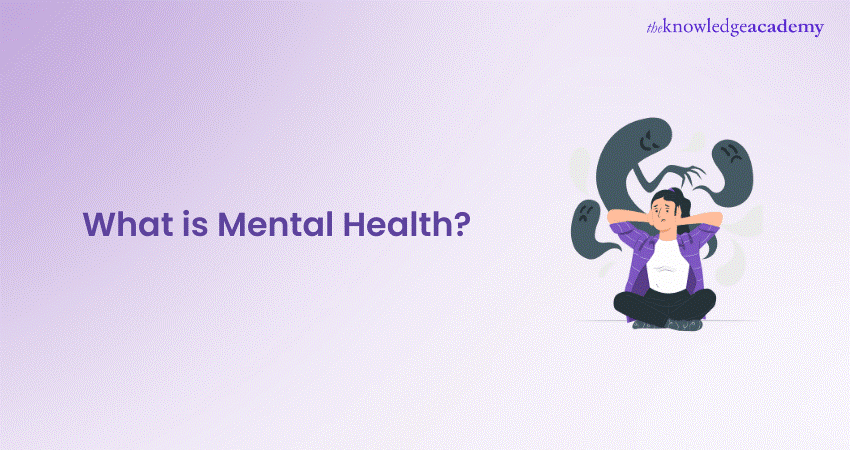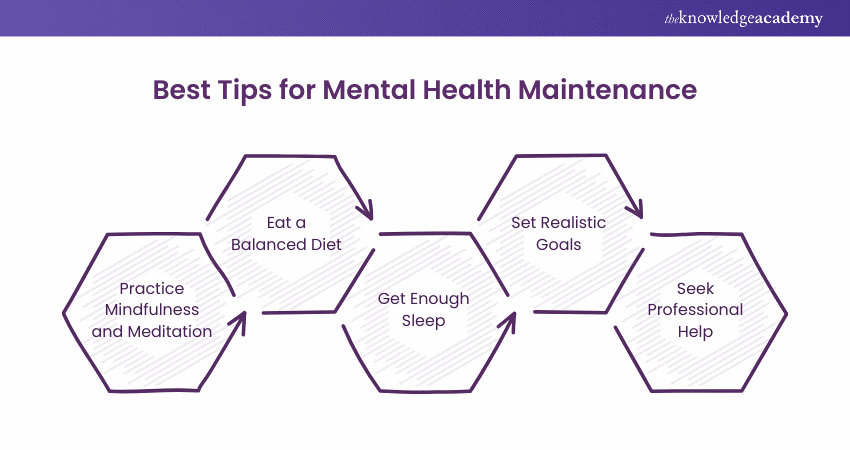We may not have the course you’re looking for. If you enquire or give us a call on +1 7204454674 and speak to our training experts, we may still be able to help with your training requirements.
Training Outcomes Within Your Budget!
We ensure quality, budget-alignment, and timely delivery by our expert instructors.

Can you picture yourself being poised amidst life’s challenges? With profound humbleness, learnt lessons stronger relationships and thoughtful lessons! Yes! you heard it right! This is truly the essence of good Mental Health. While good mental health promotes the above-mentioned traits, it can also be detrimental if it is on the other side of the spectrum. Needless to say, Mental health impacts every facet of your life, from your emotional state to your social interactions.Additionally, Mental Health is a vital aspect of your overall well-being, yet ironically it is often goes overlooked.
According to Statista, about 36 per cent of people worldwide believe it to be the biggest health issue their country is facing, while 26 per cent believe it to be stress. Let’s explore its significance and discover practical ways to enhance it every day.
Table of Contents
1) Mental Health Definition
2) Prevalence of Mental Health Disorders
3) Common Types of Mental Health Disorders
4) Identifying Early Warning Signals
5) How you can Treat Mental Health Issue?
6) Tips for Mental Health Maintenance
7) Conclusion
Mental Health Definition
Mental Health encompasses the emotional, psychological, and social aspects of well-being. It involves how individuals perceive and manage their emotions, handle stress, maintain relationships, and make choices. Beyond the absence of mental health illness, it highlights the presence of positive mental states and functioning.
Emotional well-being includes understanding and expressing emotions healthily, while psychological well-being focuses on cognitive processes like thoughts, beliefs, and attitudes. Social well-being emphasises the quality of relationships and interactions with others. It involves forming and maintaining healthy connections, fostering a sense of belonging, and participating in supportive social networks. It also includes effective communication, empathy, and cooperation with others, denoting a sign of good Mental Health.
Prevalence of Mental Health Disorders
Mental disorders are widespread, affecting millions globally across all demographics. The World Health Organisation (WHO) states that one in four people will experience a Mental Health disorder in their lifetime, underscoring the significant impact of these conditions. These disorders, including anxiety, mood, personality, eating, and substance use disorders, can severely affect daily functioning and quality of life.
Factors affecting Mental Health, such as genetic predisposition, environmental stressors, trauma, and societal influences, can contribute to the development of these disorders.
Learn essential strategies for managing stress and enhancing your emotional resilience – join our Mental Health and Wellbeing Training now!
Common Types of Mental Health Disorders
Mental disorders exist in various types, each with unique characteristics and roots and encompass various conditions affecting individuals' thoughts, emotions, and behaviours. Comprehending the various types of Mental Health disorders is crucial for recognising their signs and symptoms and promoting effective treatment and recovery.

a) Anxiety Disorders: These conditions are marked by excessive worry and fear that can disrupt daily life. Mental Health disorders of this nature include generalised social anxiety disorder (SAD), panic disorder, anxiety disorder, phobias, and Obsessive-compulsive Disorder (OCD). b) Mood Disorders: These encompass Mental Health conditions such as bipolar disorder and depression (major depressive disorder). Depression includes loss of interest and persistent sadness, while bipolar disorder involves alternating periods of elevated mood (mania) and depression.
c) Personality Disorders: These are characterised by enduring behaviour patterns, cognition, and inner experiences that deviate from cultural norms. Examples of these Mental Health disorders include borderline personality disorder (BPD), narcissistic personality disorder (NPD), and others.
d) Eating Disorders: These are serious Mental Health conditions related to unhealthy eating patterns and distorted body image. Common types include Anorexia Nervosa (restricting food intake), Bulimia Nervosa (binge eating followed by purging), and Binge-eating Disorder (excessive food consumption without purging).
Take control of your anxiety by signing up for our Anxiety Course – start your journey towards a calmer life!
Identifying Early Warning Signals
There are certain early signs that need to be acknowledges for the early detection of Mental Health issues and changing course towards an improved well-being. This can be managed and sought as needed once attention is paid to changes in mood, behaviour, bodily symptoms, social interactions, and cognitive output.
1) Changes in Mood and Behaviour
Discernable variations in mood and behaviour should be considered as a early-warning sign for possible Mental Health problems. Some of the signs like mood swings, becoming easily irritated or angry, or displaying those behaviours without any obvious reason could signal something more serious. It is therefore important that such changes are realised and dealt with to ensure good and healthy mind.
2) Persistent Physical Symptoms
Persistent physical symptoms, including headaches, stomach aches, fatigue, and sleep disturbances, can indicate underlying Mental Health issues. Acknowledging the connection between physical and mental well-being is important. Seeking medical and support is necessary for holistic care.
3) Social Withdrawal and Isolation
The most conspicuous initial symptoms associated with Mental Health problems include social isolation and seclusion. Inability to socialise, lack of interest in certain activities and shyness may be a sign of anxiety, depression or other related illness. Another crucial aspect is the need of assistance for such purposes.
4) Decline in Performance or Concentration
A decline in performance and concentration can be early signs of Mental Health concerns. Difficulties with focus, decision-making, and completing tasks may indicate anxiety, depression, or ADHD. Seeking support, implementing strategies, and practising self-care are key to managing these challenges effectively.
5) Substance Abuse
Substance abuse can be an early warning signal for underlying Mental Health issues. Individuals may turn to substances to cope with emotional pain or distress. Recognising the link between substance abuse and this health condition is crucial for seeking comprehensive support and treatment for both issues.
How you can Treat Mental Health Issue?
When it comes to mental well-being, seeking help and support is crucial for overall well-being. By accessing professional Mental Health services, building supportive networks, and practicing self-care, individuals can nurture their mental and emotional health and find the necessary resources for support and healing. Those pursuing a Mental Health Career play a vital role in providing these essential services and guiding individuals on their path to mental wellness.
1) Professional Mental Health Services
Seeking professional Mental Health services is crucial for addressing concerns regarding mental well-being. Mental and emotional care professionals, such as therapists, counsellors, and psychiatrists, can provide assessment, diagnosis, and appropriate treatment options. These professionals incorporate a safe and supportive environment to explore and manage such issues, promoting overall well-being and recovery.
2) Supportive Networks and Communities
Having a network of supportive communities is crucial for Mental Health. Being surrounded by understanding and empathetic individuals can offer a sense of belonging, validation, and emotional support. Participating in support groups, engaging with online communities, or seeking advice from trusted individuals can assist in navigating challenges and building resilience.
3) Self-care Practices
Engaging in self-care practices is essential for maintaining and improving Mental Health. Prioritising activities that promote relaxation, stress reduction, and self-reflection can have significant benefits. This includes practices such as exercise, mindfulness, healthy sleep patterns, hobbies, and setting boundaries. Self-care contributes to overall well-being and enhances resilience against these challenges.
Tips for Mental Health Maintenance
Maintaining good Mental Health is essential for overall well-being and quality of life. Here are some practical tips to help you maintain the same:

a) Physical activity can reduce stress and enhance your mood. Aim for at least 30 minutes of exercise most days of the week.
b) Incorporate multiple fruits, vegetables, whole grains, and lean proteins into your diet.
c) Quality sleep is essential for mental well-being. Aim for 7-9 hours of sleep per night and maintain a consistent sleep schedule.
d) Techniques, including mindfulness and meditation can help manage stress and improve emotional regulation. Set aside a few minutes each day for these practices.
e) Maintain strong relationships with friends and family. Social support is vital for Mental Health, so make time for meaningful interactions.
f) Divide tasks into manageable steps and set achievable goals. This can aid in reducing feelings of overwhelm and increase a sense of accomplishment.
g) If you’re struggling, don’t hesitate to seek help from a Mental Health professional. Therapy and counselling can come up with valuable support and strategies.
h) Substance use can negatively impact Mental Health. Limit alcohol consumption and avoid recreational drugs.
i) Make time for activities you enjoy. Hobbies can provide a sense of purpose and relaxation.
j) Regularly focusing on things you’re grateful for can boost your mood and entire outlook on life. Consider keeping a gratitude journal.
Conclusion
Prioritising mental well-being isn’t just about avoiding illness; it’s about thriving emotionally, psychologically, and socially. By embracing positive Mental Health practices, we can build resilience, foster meaningful connections, and navigate life’s challenges with confidence. Let’s commit to promoting well-being every day.
Sign up for our Prevention Psychology Training and discover how to foster long-term Mental Health!
Frequently Asked Questions

Mental Health significantly influences every aspect of a person's life, including emotional well-being, relationships, productivity, and overall quality of life. Poor mental condition can result in difficulties to manage stress, decision-making, and interact with others.

Mental health is the overall state of emotional and psychological well-being, encompassing the ability to manage life’s challenges. Mental illness, on the other hand, involves diagnosable conditions that affect a person's thinking, behaviour, and emotional state, often requiring professional intervention and treatment.

The Knowledge Academy takes global learning to new heights, offering over 30,000 online courses across 490+ locations in 220 countries. This expansive reach ensures accessibility and convenience for learners worldwide.
Alongside our diverse Online Course Catalogue, encompassing 19 major categories, we go the extra mile by providing a plethora of free educational Online Resources like News updates, Blogs, videos, webinars, and interview questions. Tailoring learning experiences further, professionals can maximise value with customisable Course Bundles of TKA.

The Knowledge Academy’s Knowledge Pass, a prepaid voucher, adds another layer of flexibility, allowing course bookings over a 12-month period. Join us on a journey where education knows no bounds.

The Knowledge Academy offers various Health & Safety Courses, including the Mental Health and wellbeing Training, Positive Psychology Course, and Prevention Psychology Training. These courses cater to different skill levels, providing comprehensive insights into Evolutionary Psychology.
Our Health & Safety Blogs cover a range of topics related to Mental Health and Hygiene, offering valuable resources, best practices, and industry insights. Whether you are a beginner or looking to advance your Health and Safety knowledge, The Knowledge Academy's diverse courses and informative blogs have got you covered.
Upcoming Health & Safety Resources Batches & Dates
Date
 Mental Health and Wellbeing Training
Mental Health and Wellbeing Training
Fri 10th Jan 2025
Fri 14th Feb 2025
Fri 11th Apr 2025
Fri 13th Jun 2025
Fri 8th Aug 2025
Fri 26th Sep 2025
Fri 21st Nov 2025







 Top Rated Course
Top Rated Course


 If you wish to make any changes to your course, please
If you wish to make any changes to your course, please


